The New Age of Consulting:
Powered by AI, Driven by People
How agile firms are redefining value in an era of automation and human insight.
The Global Consulting market is worth $400 billion, but the model that built it is under strain
Mark Grignon – CEO, Kognitiv
To explore this trend, Kognitiv surveyed 500 HR decision makers in the UK and Germany to uncover how this shift is unfolding, what is driving it, and how specialized consultancies are redefining the market. Expand each section below to read more:
Rising economic pressure puts strain on the traditional consultancy model
Consultancy firms across the board have seen steady growth over the past three decades, a trend which is set to continue, with The Times1 predicting that almost every industry plans to increase its use of consultants in 2025 to support AI innovation. But while demand remains stable, expectations for what businesses expect from a consultancy is seeing major changes. According to our research among HR Decision makers in the UK and Germany, the partnerships are not necessarily working. Just 1 in 4 (26%) of those working with consultancies in the UK believe them to be essential to their work. This rises to one-third (32%) in Germany. Generally, the feeling is that consultancies can be useful when used sparingly for specific challenges. Some even believe them to be disappointing, difficult to work with and to regularly under deliver.
As economic pressures mount and AI proves its ability to improve routine analysis, clients are no longer satisfied with “a PowerPoint in a suit.” In fact, an overwhelming majority - 80% of the UK and 71% in Germany - want consultancies to better integrate AI. The research suggests HR leaders see the value in AI, but consultancies are not making the most of it. The majority of HR leaders also consider the industry to be slow to adopt or adapt to AI, presenting a real opportunity for evolution in the coming years.
50% of HR decision makers think the consultancy industry is slow to adopt or adapt to AI
75% would like third parties to better integrate AI into their services and offerings
The hidden complexity tax
The Complexity Tax is the hidden cost that organizations pay to consultancies when partnerships become overrun with complicated processes, slow approvals, and legacy systems. This tax not only costs the customer financially but also means they are less efficient and arguably less creative.
These costs can manifest in different ways, such as:
- Sticky contracts
- Slow onboarding
- Layers of unnecessary consultants
- Opaque billing
- Services they don’t need
- Lack of flexibility when business needs change
Complexity Tax is the hidden cost of working with consultancies overrun by slow approvals, legacy systems and redundant layers.
The rise of the boutique consultancy
The HR consulting market in Europe is currently generating around $21.5 billion of sales revenue in 2025, as the demand for consulting continues to rise, with an expected annual growth rate of at around 7%2. However, smaller, boutique firms addressing niche market segments are making significant gains in market share as consultancy demands change3.
Global firms rely on large teams and a one-size-fits-all template, whereas smaller consultancies double down on what matters most for businesses now. Essentially: agility, expertise and authenticity over scale. With a more tech-savvy approach, smaller consultancies are disrupting the sector with quicker responses, tailored solutions and deep integration with client teams.

Not constrained by legacy systems and over-complicated processes, they address the frustrations that businesses are seeing with the traditional consultancy model, by combining technological fluency with human insight, delivering measurable outcomes rather than abstract recommendations. It’s a simpler, but ultimately more powerful and impactful approach.
This opportunity for disruptive simplicity is what drives Kognitiv’s own unique ‘power by the hour’ consulting model, enabling targeted, flexible support for Workday customers without weighing them down with rigid contracts or working models.
AI is reshaping expectations
The consultancy model that defined the past three decades is being rewritten. The UK market is optimistic about the future of the consultancy industry featuring a hybrid model that combines AI with human expertise (59%), compared to less than half in Germany (43%).
.png?width=4004&height=2139&name=Picture2%20(1).png)
As automation scales and budgets tighten, organizations are seeking consultancy partners who can combine technological intelligence with human insight to drive valuable results.
The consultancy of the future is not AI vs humans, it’s AI-empowered humans who can provide judgement and strategy alongside automation.
For more information, visit https://kognitivinc.com/
1 The Times, UK consulting industry to grow again after year of contraction, 2025
2 Cognitive Market Research, Europe HR Consulting Service Market Report 2025
3 Markwide Research, Europe Consulting Services Market - Size, Share, Trends, Growth & Forecast 2025-2034
About Kognitiv
Kognitiv is a certified Workday AMS Services Partner delivering flexible, pay-as-you-use consulting across the globe that perfectly aligns with Workday’s innovation and agility. Since 2016, Kognitiv’s Post Production Support (PPS) model has empowered global Workday customers to maximize their investment by providing the effective support they need—when they need it—without being locked into fixed-spend agreements. From ad-hoc ticket resolution and fully managed services to new SKU deployments, custom app development, project management, and change management, Kognitiv supports every phase of the Workday product lifecycle. Clients are backed by world-class consulting teams with the right blend of skills to support the full spectrum of Workday functionality.
We are trusted by












